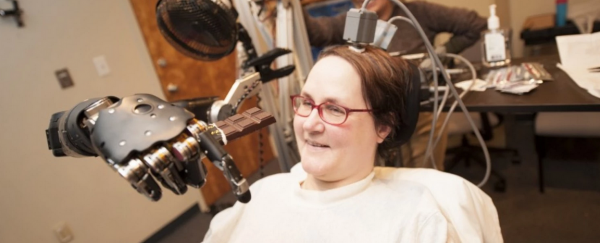A 55-year-old quadriplegic named Jan Scheuermann has successfully used nothing but her thoughts to control an F-35 fighter jet and a single-engine Cessna in a flight simulator.
The achievement is the result of two years of training as part of the US Defence Advanced Research Projects Agency (DARPA) Revolutionising Prosthetics program.
DARPA director Arati Prabhakar announced the achievement at the Future of War forum in the US last week, and explained that the program aims to push the boundaries of prosthetics and find out exactly what people can do using just their minds. But Sheuermann has exceeded even their expectations.
Sheuermann became paralysed in 2003 as a result of a genetic neurodegenerative condition. In 2012 she was recruited for the Revolutionising Prosthetics program, and had two electrodes fitted on the surface of her motor cortex - the area of the brain that controls her hand and arm movements.
Her training started with her learning how to control a robotic arm to give herself high fives and feed herself chocolate bars. The researchers found that she was surprisingly good at controlling both right and left robotic arms using just her mind, but she wanted to try more.
"Jan decided that she wanted to try flying a Joint Strike Fighter simulator," Prabhakar said at the forum. "So Jan got to fly in the simulator."
But here's the most incredible part, instead of Sheuermann thinking about controlling a joystick to fly the plane, like most people using the simulator technology would, she actually imagined flying the plane herself.
You can see her simulation in action below in this footage from the University of Pittsburgh, who run the prosthetics program with DARPA:
"Instead of thinking about controlling a joystick, which is what our ace pilots do when they're driving this thing, Jan's thinking about controlling the airplane directly. For someone who's never flown - she's not a pilot in real life - she's flying that simulator directly from her neural signalling," said Prabhakar during the forum.
This is an incredible result, but, like with most breakthroughs, it also brings up some ethical concerns. Prabhakar explained:
"We can now see a future where we can free the brain from the limitations of the human body and I think we can all imagine amazing good things and amazing potential bad things that are on the other side of that door."
For now though, we can't help but think of all the incredible things that could come from this research. Imagine people with quadriplegia, motor neuron diseases or locked-in syndrome being able to be able to be freed from their bodies - even if only in simulations.
Jan Scheuermann, you're our new hero.
You can watch Prabhakar's full talk at the forum below:
Source: The Washington Post
